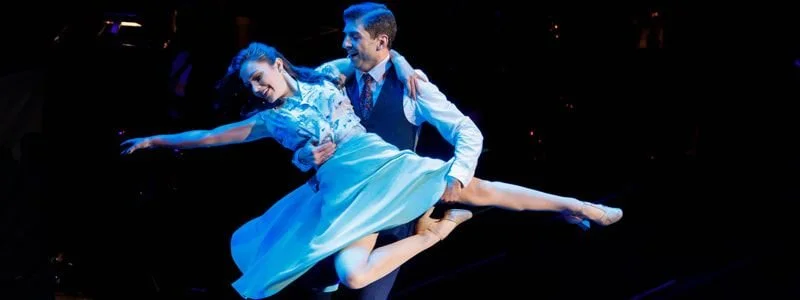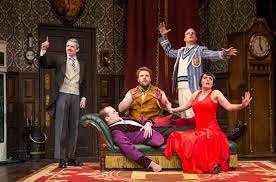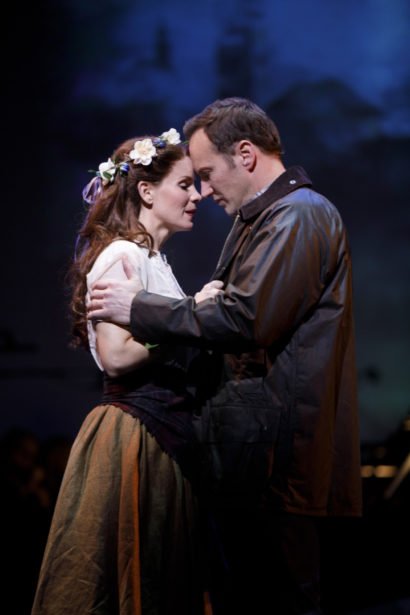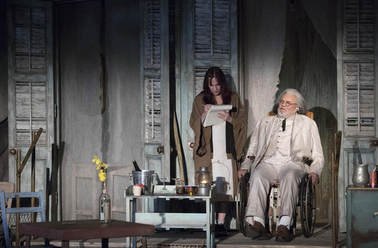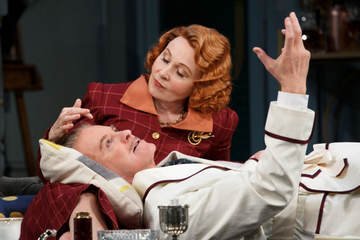Best of 2017
In a year chock full of political controversy, sexual abuse allegations, and horrific acts of violence, it should come as little or no surprise that those topping my 'best of list' this year are in the realm of pure escapism. While during the Depression, RKO gave our grandparents Fred and Ginger to tap their troubles away to; in 2017, Scott Rudin paired Bette Midler with Jerry Herman to help us avoid (at least for a few hours) the latest Twitter rant to go viral. Comedy, song, and dance has never felt as essential.
In spite of the divisiveness that defines our country at this very moment, the theater provides us with an opportunity to cherish something that is becoming unfortunately rarer and rarer these days – a pure, communal experience. From the enthusiastic ovations of a star’s entrance to the tense, collective breaths held during a dramatic monologue, I am grateful to have had those moments this year that reminded me of our shared humanity. This is what has kept the theater alive since ancient times and this is what makes it as necessary as ever today. And while it feels like each day we are inching closer and closer to our own apocalypse, leave it to a Golden Age musical comedy from over a half century ago to remind us that “the world is full of wonderful things.” Here’s this year’s list, mentioning just a few of those wonderful things.
It should be noted that both The Band’s Visit and Oslo appeared on my Best of 2016 List in recognition of their off-Broadway runs last year. They certainly would be on the top of this year's list if not previously recognized.
1. Crazy For You: Theater is, by its very nature, an ephemeral art form. As such, there is something extra special about being in the audience for a one-night only presentation, particularly if it's a star-studded affair directed and choreographed by one of musical comedy's funniest and most inventive talents, Susan Stroman. In honor of its 25th anniversary, Manhattan Concert Presentations staged this classic Gershwin/Ludwig confection (adapted from the Gershwins' 1930 Girl Crazy) complete with original Stroman choreography. Produced with a cast to make comedy and musical theater fans drool: Tony Yazbek (Bobby Child), Laura Osnes (Polly Baker), Harry "the original Bobby Child" Groener (Bela Zangler), Rachel Bloom (Irene Roth), Jerry O'Connell (Lank Hawkins), Mark Linn-Baker (Everett Baker), Nancy Opel (Lottie Child), and NBC favorites Jack McBrayer (Eugene Fodor) and Rachel Dratch (Patricia Fodor) - this charming show had its audience in the palm of its hand from its overture through its choreographed curtain call. Having grown up watching and loving the Paper Mill Playhouse's production on Great Performances, it was a wonderful treat to finally see a professional production of this delightful musical mounted with its Tony-Award winning choreographer at the helm. With limited rehearsal time and only one shot to 'bring it', the cast delivered performances full of passion, professionalism, and the occasional (and certainly understandable) opening night nerves - all translating into an electrifying, unforgettable night of theater. Yazbek's Bobby Child once again proves why he is currently Broadway's greatest hoofer (he came to my attention as an impressive Tulsa in the 2008 revival of Gypsy) and Osnes continues to justify why she is one of musical theater's most sought after ingenues with a Polly full of spunk and a grounded emotional center. Theater veterans Linn-Baker, Opel, and Groener add a dash of old-Broadway class to the affair while Dratch, McBrayer, Bloom, and O'Connell provided the appropriate levels of contemporary zaniness to make the material feel fresh. While each of the principals appeared to be having the time of their lives, Bloom, in particular, brought the infectious giddiness of a high school freshman on opening night to her bow. Given the applause Bloom received, it was clear this Golden Globe Award winning actress and acclaimed comic writer was fulfilling the dreams of every theater nerd in the audience.
2. Hello, Dolly!: Bette Midler, last seen in a book musical on Broadway as a replacement for Tzeitel in the 1967 cast of Fiddler on the Roof, returned to her roots starring as Dolly Levi in this year's revival of Hello, Dolly! While not the perfect musical revival I had hoped for, this 1963 classic easily became the musical theater event of the year. Even at a Saturday matinee, you could feel a collective energy amidst the audience as the overture began - an energy commonly felt at rock concerts, yet rarely at Broadway musicals these days. What was perfect about this Dolly was its star (Rudin couldn't have nabbed a bigger and brassier one) and nearly all of its principal casting, While there were moments when the 71-year old Midler's voice sounded slightly strained (most notably during Before the Parade Passes By). there is no arguing that the vaudevillian antics of Dolly Levi and the oversized comic chops of Midler were a perfect match. And those who love musical theater, couldn't help but cherish the experience as Midler descended the Harmonia Gardens' staircase (decked out in Dolly's signature elegant, red sequined gown with feathered headdress) to the opening bars of the title song in what might be the most flawless musical theater moment of 2017. David Hyde Pierce, as one can imagine, made a wonderful sparring partner for Midler. While Horace must play second banana (and understandably so) to Dolly anytime they share the stage, Director Jerry Zaks more than made it up to David Hyde Pierce and his many fans by re-installing the humorous, once-cut "Penny in My Pocket" as the second act opening. His introduction song, the cleverly choreographed "It Takes a Woman", is also one of the show's musical highlights. And in addition to Midler and Hyde Pierce, Gavin Creel and Kate Baldwin give memorable performances as Cornelius Hackl and Irene Malloy, respectively. Creel infuses Hackl with undeniable charm while Baldwin (one of Broadway's most consistently terrific actresses) finds unexpected humor and tenderness in Malloy. Next up, Bernadette Peters and Victor Garber will be taking over for Midler and Hyde Pierce, giving Broadway aficionados another chance to see a new pair of fan favorites in these roles. David Merrick had a parade of stars coming in and out for a solid six years during Dolly's original run - let's see how many Rudin will be able squeeze out of this revival!
3. The Play That Goes Wrong: There is always plenty of great theater to see in London...except on Sundays. Wanting to see a show each night I was in town, I decided to catch the long-running comedy smash The Play That Goes Wrong - ironically, just months before it opened in New York. In a nod to Murphy's law, everything that can go wrong, does go wrong in this backstage farce as a group of amateur players attempt to make it through a Mousetrap-like murder mystery. Missed cues, mixed-up props, malfunctioning sets, injured actors, and more ensue. While the comedy might be sophomoric, the hardest working cast of the season delivers comic performances of unmatched commitment, discipline, and precision. As the complexity of the slapstick grew and the absurdity of the comedy escalated, I could not think of a time when I have laughed harder in the theater. As I think back to my own childhood, I remember watching Home Alone on VHS with my father and grandfather (whose first, second, and third languages were not English!) during the 1991 Christmas holiday. Say what you want about the dramatic achievements of Home Alone, but there is something quite special and impressive about a movie whose physical comedy can leave three separate generations (ages 7 to 80) laughing uncontrollably. Grinning ear to ear as I walked out London's Duchess Theatre, I thought back to that Christmas in 1991. Though The Play That Goes Wrong may not be primed to win the Pulitzer, it is great fun - entertainment that I know would leave three generations rolling in the aisles today.
4. The Wolves: Sarah DeLappe's first play is a winner. Developed through the Breaking Ground Festival at the Huntington Theatre Company in 2016, The Wolves has enjoyed full New York productions at The Duke and most recently Lincoln Center's Mitzi E. Newhouse Theater. Set around a series of pre-game exercises and practices, nine female high school soccer players tackle the complexities of adolescence. The physical precision of their soccer drills are matched by the rapid-fire volley of DeLappe's smart dialogue. From Harry Potter to the Khmer Rouge, there is no subject matter too juvenile or cerebral for these girls. The drama that DeLappe explores is all character driven and completely authentic - eating disorders, social anxiety, athletic and academic pressures, and even death. Whether dishing on boys, gossiping about each other, talking smack about their coaches, or discussing their menstrual cycles, each conversation adds to the creation of nine very distinct characters - several of whom transcend our very own basic assumptions and biases as the play unfolds. Director Lila Neugebauer assembles a superb (for lack of a better word to describe this type of tight ensemble acting) team. While each girl has wonderful individual moments, Neugebauer shapes DeLappe's work in way that we, as audience members, never forget how instrumental relationships can be in shaping personal identity. The emotional impact of this work sneaks up on you. In the course of 90 minutes, DeLappe has you fully invested in and caring for each of these young women. While we never have the opportunity to be fans in the stands for an actual game, if we did, we'd know exactly which team we'd be cheering for.
5. Brigadoon: New York City Center presented a simply gorgeous revival of the 1947 classic that left audiences' imaginations and hearts full. Coming straight off An American in Paris (with National Tour, West End, and an upcoming Japanese productions running), Director and Choreographer Christopher Wheeldon mounts a sensitive production packed full of magic and love, primarily achieved through the score's beautiful ballads, Wheeldon's spirited dances, and the casts' earnest performances. With musical theater treasure, Kelli O'Hara as Fiona MacLaren, Loewe's melodies have never sounded more beautiful. O'Hara and Patrick Wilson's shared duets, 'The Heather on the Hill', 'Almost Like Being in Love' and 'From This Day On,' leave you wondering if finer songs have ever been written or if finer voices have every been heard on the stage. When O'Hara appears as a near memory to reprise these numbers in a New York bar room, she leaves you ready to pack your bags and return to the cursed (or is it blessed?) town of Brigadoon with Tommy Albright. For supporting roles, Wheeldon recruited two of An American in Paris' best: Robert Fairchild (originated Jerry on Broadway and in the West End) as Harry Beaton and Sara Esty (National Tour's Lise) as Jean MacLaren. While Stephanie J. Block (playing Meg Brockie) is always game for a comic number (her 'I'm Breaking Down' was the highlight of last season's Falsettos), Daily Show veteran Aasif Mandvi gave the 1940s book a fresh, yet nostalgic vibe by playing Jeff Douglas with Dean Martin-gusto. Like some of the best Shakespearean plays, this Brigadoon, gives us a fairy tale full of all different shades of love: young, pure, lustful, and melancholic.
6. Merrily We Roll Along: A friend of mine once said about Merrily We Roll Along (and I'm paraphrasing): "It can't be turned into a good musical, but it can be performed brilliantly," This is the case with the Huntington's production. The major hurdle this and any production must overcome is inherent in its structure (and the structure of the Kaufman & Hart play its adapted from): Audiences must watch and believe that these horrible, miserable, embittered adults we are introduced to in the first scene were once the young, nice, hopeful artists-in-the-making in the finale. When the Huntington Theatre Company announced it would be remounting Maria Friedman's West End revival of Merrily We Roll Along, I have to admit, I was a bit nervous. I had seen the London revival cast when it was transmitted to movie theaters and I wasn't a fan. I remember the cast of the filmed production exacerbating the problems of the musical - each of the performances overstated, abrasive, and unbelievable. Either something magical happened as this production transferred over the Atlantic or Lonny Price's terrific documentary Best Worst Thing That Could Ever Happen softened my attitudes toward the material. Perhaps most instrumental in Friedman's success is her decision to re-cast all the of the principal females with American actresses. Broadway veteran Eden Espinosa now takes on the role of Mary Flynn, the alcoholic author/critic and Boston locals Jennifer Ellis and Aimee Doherty play Beth and Gussie Carnegie, Frank's first and second wives, respectively. Even West End originals Damian Humbley and Mark Umbers as Charles and Frank have upped their games diving deeper into the text and finding subtle beats to create cohesive characterizations across time. Friedman smartly makes Frank our central (almost tragic) character. Perhaps more clearly than in the London production, we understand how he 'got to be here.' It wasn't one mistake that caused Frank's life to spiral out of control. It was many small mistakes, while sometimes misguided, always seemed right in the moment. And with Friedman making the narrative work for Frank, perhaps, she was able to make Merrily as good as it can get. While Merrily will never lose the challenges it faces with its backwards arc, there was no shortage of wonderful individual moments in the Huntington's production, most notably: the undeniable chemistry of its three central friends (most apparent in 'Old Friends'), Ellis' heart-wrenching rendition of 'Not a Day Goes By' (it's given to her character before you even really know her and yet Ellis still makes your heart ache for Beth), Doherty's deliciously vampy show-stopping finale to Musical Husbands, and the delightfully silly "Bobby and Jackie and Jack." Perhaps my favorite moment in this revival occurs in the second act when Frank and Charley showcase their soon-to-be hit song, "Good Thing Going", at Gussie's party. In this production, time metaphorically stops for Frank, Charley, and all those who are listening to these young writers on the rise. We are enchanted by their talent. We are hopeful for their futures (even though we know the outcomes). And when these writers are persuaded to perform their song one-more-time (against Charley's better judgement), our stomachs sink for them as they've outstayed their welcome and the tide has turned as the guests' attention has drifted. Surprising to me, all these fully realized individual moments paid off - for the first time, 'Our Time', the show's finale, left me feeling wistful. I tip my hat to you, Maria Friedman and the Huntington.
7. Amanda Plummer and James Earl Jones in The Night of the Iguana: This past winter, director Michael Wilson and the American Repertory Theater in Cambridge offered Boston audiences a star-studded, though uneven, revival of Tennessee William's The Night of the Iguana. I was first introduced to this play as a freshman at the College of the Holy Cross where I had the opportunity to assistant direct a production for the Department of Theatre. Over the course of four years, I would go on to study, many of the greats: Shakespeare, Ibsen, Shaw, Williams, etc. ultimately settling in on O'Neill as my favorite playwright. I explored O'Neill deeper as part of a senior honors thesis that examined parallel Freudian themes in the playwright's life and work, most prominently those displayed in his masterpiece Long Day's Journey Into Night. Upon, revisiting Iguana, I was surprised by just how much the second act of the play has in common with some of O'Neill's greatest fourth acts. In Iguana's second act, Reverend T. Lawrence Shannon, a defrocked Episcopalian minister taking refuge (in the midst of leading a vacation tour) at an old friend's Mexican motel, shares a cathartic confession with Hannah Jelkes, a spinster artist played exquisitely by Amanda Plummer. Much like Josie Hogan's offering of forgiveness and peace to a tortured James Tyrone in A Moon for the Misbegotten, Hannah's charity to Shannon is boundless while her judgement is non-existent. Plummer's performance is defined by its calmness and saintly grace. With a strong command over some of William's most poetic language, Plummer's reading of Hannah is full of kindness, humor, quirk, resilience, and redemption. And speaking of a command of William's poetry, the venerable film and stage actor James Earl Jones gives a commanding performance as Hannah's nearly 100 year old poet grandfather, Nonno, The wisdom, experience, and gravitas, he brings to Nonno's final poem reminds us we are in the presence of theater royalty - if only all WIlliam's interpretations could be as good as the ones Plummer and Jones rendered.
8. A Doll's House: Part 2: Lucas Hnath, one of our most talented contemporary playwrights, is enamored by debate. While his last play, The Christians (unfortunately I never saw it performed, but read it afterward), was a terrific dissection of faith, A Doll's House: Part 2 picks up 15 years after A Doll's House left off and examines and disputes the conventions surrounding marriage, motherhood, gender, and law. A tightly constructed parlay, A Doll's House: Part 2 is a 90 minute joyride. While the characters are familiar to us, Hnath uses his sequel as a clever springboard for contemporary discourse full of hilarious one-liners and surprising, but logical twists and turns. While Nora was the hero of Ibsen's original, Hnath makes sure he gives everyone an equal voice in the sequel including Anne Marie, the Helmer's servant/nanny who had to sacrifice her life to pick-up the responsibilities that Nora left behind, Torvald, the emotionally devastated husband, and Emmy, the daughter made in her mother's pre-enlightened' likeness. Still, with nearly 140 years between the original and this sequel, enough time has passed to poke some fun at these consequences through deconstruction. Laurie Metcalf dazzles at the center of a strong Broadway ensemble giving one of the season's most memorable performances as the funny, self-aware, and often absurdist Nora Helmer. With four actors, a recognizable property, a single set, and an audience pleasing script, A Doll's House: Part 2 will surely be one of the most produced plays of next season.
9. The Hairy Ape: While Eugene O'Neill's 1922 expressionistic play The Hairy Ape is best known for its indictment of industrialism, its themes of class conflicts, disillusionment, and the disharmony between the self and society were particularly pertinent in 2017. Originally staged at the Old Vic in London, this re-conceived production by Director Richard Jones was mounted in Manhattan's huge Park Avenue Armory. Set (and costume designer) Stewart Laing brought Ape's theme of the mechanization of society to life through a giant circular conveyor belt used to help set each of the play's eight episodes. Bobby Cannavale plays Robert "Yank" Smith, a stoker, who after being humiliated by Mildred, the daughter of a rich steel corporation executive, goes on an unsuccessful search to find his sense of humanity/belonging among 5th Avenue aristocrats, the Wobblies, and eventually a gorilla in the zoo. Cannavale is perfectly cast in this role - he imbues strength, machismo, and athleticism. In the early scenes, he possesses a coarse pride that matches the fire he's fueling in the boiler. And as he journeys as a 'forgotten man' through a new 20th century world, we see Cannavale's desperation, frustration, and despair grow in a quite moving way. Giving one of the most visceral performances this year, he's one of our most gifted stage actors - the type Directors like Harold Clurman or Lee Strasberg would have killed to work with at the Group Theater. Other standouts in the cast also include David Constabile as Paddy, a terrific foil for Yank as he bemoans the loss of the sea's romanticism to the age of coal, and Becky Ann Baker as Mildred's reticent Aunt. While Jones gives his all to use the expansive Armory to the show's advantage, much of the claustrophobia that sets in on Yank and his "caged" comrades is lost on the audience in this unique theater setting. The Old Vic provides a first-class memorable production in an unforgettable venue, but one can't help long for the heat O'Neill's original audience must have felt in Greenwich Village's tiny Provincetown Playhouse
10. Kevin Kline and Kate Burton in Present Laughter: Since Present Laughter first opened on Broadway in 1946, stars have lined up regularly to step into the role of Garry Essendine, a part Noel Coward originally wrote for himself. Academy Award winner Kevin Kline follows in the footsteps of Victor Garber, Frank Langella, George C. Scott (which also featured Kate Burton as Daphne Stillington), Coward, and Clifton Webb on the Great White Way; in addition to the dozens of other well-respected actors who have tackled the part in the regional market and abroad. The best way to describe Kline's comic performances is effortless. From his witty deliveries to a seductive lean or a double take in the mirror, Kline is in full control of his elegant performance; with every gesture so deliberate (yet smooth) you know Essendine blocked it himself. With Kline comes the athleticism of a former matinee idol and with the oral polish of a classically-trained actor. Kate Burton provides equal sophistication as Garry's wife, Liz. Filling Liz with equal parts dignity and warmth, she serves as the perfect partner to challenge, calm, and bring order into the life of the man whose number she knows so well. Kline and Burton's scenes are some of the very best in this revival, reminding audiences how good high comedy can be when performed with style. This winter, I took a group of high school students to see the play. While I was expecting them to enjoy the big showbiz egos and farcical twists the most, I was taken a bit off guard to hear what themes they were talking about afterward. Surprisingly, this group of fourteen to eighteen year old boys were most fascinated by the blurred lines between one's public/stage persona and one's self. Clearly - if this was the topic of conversation during our post-show dinner, it must be chalked up to Kline's carefully etched portrayal of Broadway's most popular narcissist.
Honorable Mention:
The Stage Management of Burn All Night: Whether you like it or not, immersive theater is here to stay. With a catchy, pop score by Van Hughes, Nicholas LaGrasta, and Brett Moses (members of Teen Commandments), Burn All Night is a coming-of-age story set in and around the night life of New York City as the end of the world approaches. While the score, genres, and stakes all make the dramaturgy of this piece a bit incongruous, the stage management of this production deserves special commendation. In an effort to attract young, spirited theater-goers, drinks are sold from the bar throughout the performance, with many of the scenes being staged around a shifting audience to bring viewers directly into the heart of the action. Given the major physical obstacles of this production, it's not surprising that at least two glasses broke in the middle of the performance. Responding to the spilled booze and shattered glass, the crew members of Burn All Night were barely seen or heard as they swiftly cleaned up the mess before the audience was required to make its next shift. The show must go on and it did, indeed, thanks to the skill and professionalism of Burn's backstage team.


